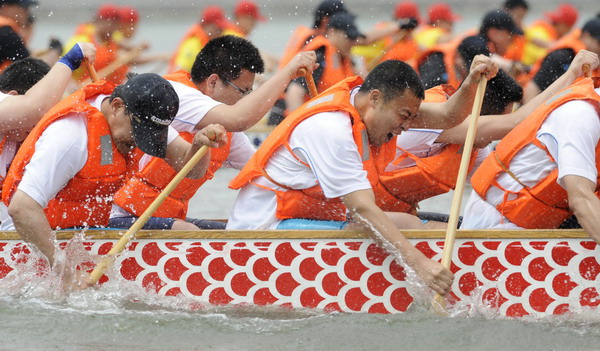Society
Enter the dragons
Updated: 2011-06-06 08:45
By Qiu Quanlin and Tan Yue (China Daily)
But Wu, from Jiujiang township in Foshan, Guangdong province, also has another claim to fame: He stole the spotlight when he "ran on water" - across the surface of the Pearl River - at the opening ceremony of last year's Guangzhou Asian Games as one of the last five torchbearers.
"It is hard to imagine that I could have achieved such glory if I hadn't taken up dragon boat racing," he said.
Wu's family has a long history in Yannan village of Jiujiang, near the Jiujiang River, a tributary of the Pearl River, where dragon boats have always been a traditional pastime.
There are several versions of the origins of dragon boats. The most popular commemorates Qu Yuan, a poet and loyal but exiled court official in the southern state of Chu during the Warring States period (475-221 BC). According to the legend, Qu waded into the Miluo river carrying a large rock to commit suicide to maintain his integrity upon learning of a coming invasion by a neighboring state.
Hearing of his death, people rushed out to the middle of the river in their fishing boats and beat drums and splashed the water with their paddles in order to keep evil spirits from his body. Later on, they scattered rice into the water to prevent the fish from devouring his body.
It then evolved into the annual dragon boat festival that falls on the "double fifth" - the fifth day of the fifth month of the lunar calendar - in which people often eat zongzi, rice dumplings wrapped in bamboo or reed leaves.
As Chinese people have settled in different parts of the world, the festival, especially the dragon boat racing, has become a feature of local Chinese communities around Asia, Europe, the United States and Oceania. Now more than 50 million people in more than 50 countries and regions regularly participate in dragon boat racing, according to the Chinese Dragon Boat Association.
Last year, at the Asian Games in Guangzhou, dragon boat racing was staged as a competitive event for the first time, which was far beyond Wu's imagination when he first became involved as a child.
Wu's family had four boats and he began rowing when he was 10 years old.
"I know only two things - fish-farming and racing," he said.
"I watched my father competing. It was so exciting. I wanted to do it too."
He joined the local racing team when he was 20.
"My childhood experience has greatly helped me improve my skills in dragon boat racing."
Hard training has helped Wu and his team win dozens of medals in competitions over the last two decades and the Jiujiang team has had many chances to participate in large dragon boat racing events due to its outstanding performance in Guangdong province.
At the Asian Games, Wu led the Chinese squad to two bronze medals in the men's 250-meter and 500-meter straight races.
"Young people like me always dreamed of being a successful racer. Racing allows us to visit so many places," he said.
However, that is no longer the case since taking over as the coach of the Jiujiang squad in January, Wu is trying to think of ways to attract more young people to participate in dragon boat racing.
"Now fewer local people carry on the tradition," said Zhu Wenquan, who was Wu's predecessor as coach. "The racing is very tough and young people are more interested in finding jobs in cities."
Few local people have developed any interest in dragon boat racing in recent years although the Jiujiang team has performed outstandingly in a series of domestic and international events, according to Zhu.
"When we played in the Asian Games last year, the average age of the team members was almost 40 years old," said Zhu.
The current team includes six retired players from Liaoning and Hunan provinces and six young local players.
Yu Hanqiao, the secretary-general of the Chinese Dragon Boat Association, expressed the same concerns.
"Although the birthplace of dragon boats, China is losing the advantage. Our Asian neighbors and countries in the Europe and America are doing great now," Yu said. "It is a good thing to make dragon boats a competitive sport. But we should pay more attention to the cultural connotations of it and observe all the related rituals as a whole, or dragon boats will attract fewer and fewer people."
For Wu, launching a national dragon boat league would help attract more young people to participate in the traditional event.
"Dragon boat racing should be done in a professional way. There should be more professional participants and clubs," Wu said. "Only through establishing professional clubs can participants have a stable income and dragon boat racing be promoted."
The Jiujiang club was set up three years ago, with an investment of nearly 6 million yuan ($925,000) from a local wine company. Under the club system, each player earns 1,500 yuan each month. If they take part in competitions they make more money. After the Asian Games, the local government also awarded the team 1.5 million yuan.
Wu said there should also be more schools to develop young talent. At present, China has only one dragon boat academy. The school, based in Jiujiang, has so far developed more than 40 professional players, two of whom are in the Jiujiang club.
Specials

Birthday a new 'starting point'
China's national English language newspaper aims for a top-notch international all-media group.

Room at the inn
The Chinese hotel industry experiences a building boom, prompting fears of oversupply.

Pearls of wisdom
Chinese pearl farmers dominate the world market but now want to work smarter, not harder




